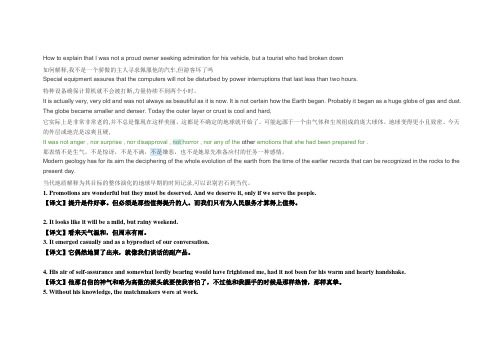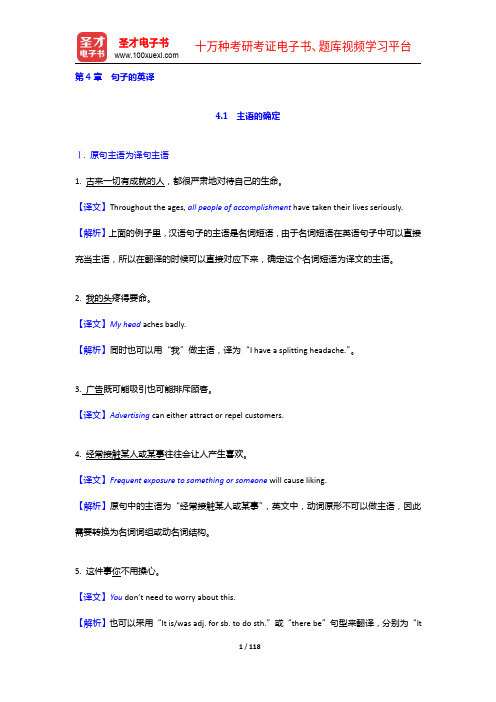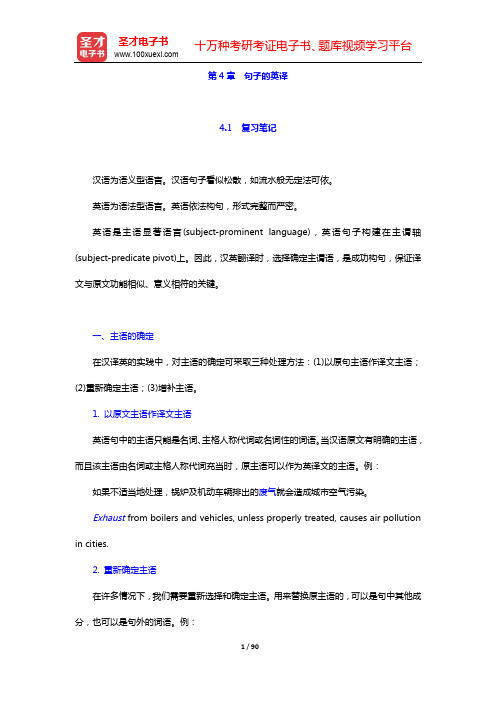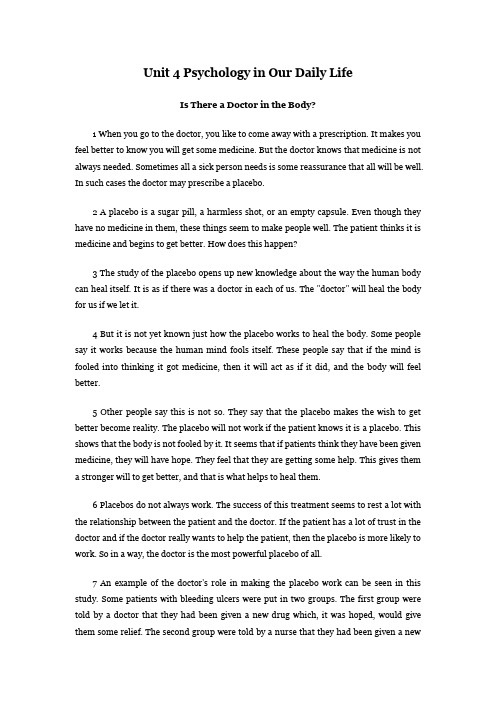陈宏薇《新编汉英翻译教程》(第2版)-第4章 句子的英译【圣才出品】
《新英汉翻译教程》第四章课后答案

How to explain that I was not a proud owner seeking admiration for his vehicle, but a tourist who had broken down如何解释,我不是一个骄傲的主人寻求佩服他的汽车,但游客坏了吗Special equipment assures that the computers will not be disturbed by power interruptions that last less than two hours.特种设备确保计算机就不会被打断,力量持续不到两个小时。
It is actually very, very old and was not always as beautiful as it is now. It is not certain how the Earth began. Probably it began as a huge globe of gas and dust. The globe became smaller and denser. Today the outer layer or crust is cool and hard,它实际上是非常非常老的,并不总是像现在这样美丽。
这都是不确定的地球就开始了。
可能起源于一个由气体和尘埃组成的庞大球体。
地球变得更小且致密。
今天的外层或地壳是凉爽且硬,It was not anger, nor surprise, nor disapproval, not horror, nor any of the other emotions that she had been prepared for.那表情不是生气,不是惊讶,不是不满,不是嫌恶,也不是她原先准备应付的任务一种感情。
Modern geology has for its aim the deciphering of the whole evolution of the earth from the time of the earlier records that can be recognized in the rocks to the present day.当代地质解释为其目标的整体演化的地球早期的时间记录,可以识别岩石到当代。
陈宏薇《新编汉英翻译教程》(第2版)教材的配套题库(4-6章)【圣才出品】

第4章句子的英译4.1主语的确定Ⅰ.原句主语为译句主语1.古来一切有成就的人,都很严肃地对待自己的生命。
【译文】Throughout the ages,all people of accomplishment have taken their lives seriously.【解析】上面的例子里,汉语句子的主语是名词短语,由于名词短语在英语句子中可以直接充当主语,所以在翻译的时候可以直接对应下来,确定这个名词短语为译文的主语。
2.我的头疼得要命。
【译文】My head aches badly.【解析】同时也可以用“我”做主语,译为“I have a splitting headache.”。
3.广告既可能吸引也可能排斥顾客。
【译文】Advertising can either attract or repel customers.4.经常接触某人或某事往往会让人产生喜欢。
【译文】Frequent exposure to something or someone will cause liking.【解析】原句中的主语为“经常接触某人或某事”,英文中,动词原形不可以做主语,因此需要转换为名词词组或动名词结构。
5.这件事你不用操心。
【译文】You don’t need to worry about this.【解析】也可以采用“It is/was adj.for sb.to do sth.”或“there be”句型来翻译,分别为“Itis unnecessary for you to worry about this thing.”“There is no need for you to worry about this.”6.人总是在面临考验的关头,才发现自己的专长。
【译文】It is in the hour of trial that a man finds his true profession.【解析】译文采用“It is...that...”的句式,将原句译为强调句,原句主语“人”对应译为译句主语“a man”。
新英汉翻译教程第四章翻译的技巧答案 共89页

【改后译文】最好的办法就是要逐渐使自己关 心更多的事情,甚至关心那些跟自己无关的 事情。
21
返回章重点 退出
课堂互动1: B. 改译下列翻译不理想、不 正确的句子(参考译文)
8. The broker’s hour is not only crowded, but minutes and seconds are hanging to all the traps and packing both front and rear platforms. (O. Henry)
【译文】我的教育开始之前,就像这样一条船, 只是没有罗盘和测深绳。
【改后译文】在我开始接受教育之前,就像这 样一条船,没有罗盘,没有测深绳。
20
返回章重点 退出
课堂互动1: B. 改译下列翻译不理想、不 正确的句子(参考译文)
7. The best way is to make your interests gradually wider and more impersonal.
5
返回章重点 退出
例1:A gentleman is,rather than does. (English For Today)
【译文】绅士是天生的,不是做出来的。
6
返回章重点 退出
例2:Every tree and every branch was encrusted with bright and delicate hoarfrost, white and pure as snow, delicate and defined as carved ivory.
How to Double Your Vocabulary)
陈宏薇《新编汉英翻译教程》(第2版)配套教材复习资料-第4章 句子的英译【圣才出品】

第4章句子的英译4.1 复习笔记汉语为语义型语言。
汉语句子看似松散,如流水般无定法可依。
英语为语法型语言。
英语依法构句,形式完整而严密。
英语是主语显著语言(subject-prominent language),英语句子构建在主谓轴(subject-predicate pivot)上。
因此,汉英翻译时,选择确定主谓语,是成功构句,保证译文与原文功能相似、意义相符的关键。
一、主语的确定在汉译英的实践中,对主语的确定可采取三种处理方法:(1)以原句主语作译文主语;(2)重新确定主语;(3)增补主语。
1. 以原文主语作译文主语英语句中的主语只能是名词、主格人称代词或名词性的词语。
当汉语原文有明确的主语,而且该主语由名词或主格人称代词充当时,原主语可以作为英译文的主语。
例:如果不适当地处理,锅炉及机动车辆排出的废气就会造成城市空气污染。
Exhaust from boilers and vehicles, unless properly treated, causes air pollution in cities.2. 重新确定主语在许多情况下,我们需要重新选择和确定主语。
用来替换原主语的,可以是句中其他成分,也可以是句外的词语。
例:以往的国际文献认为,印度是亚洲水稻的原产地。
Previously, in the international literature, India was said to be the country where Asian rice originated. (郭建中译)原文主语“国际文献”被译作介词短语in the international literature,充当句中状语;而作原文宾语的主谓词组中的主语“印度”则成了译文的主语。
译文达意,且句式严整、顺畅。
这是汉译英时常需采用的处理手法。
3. 增补主语汉语中,主语隐含不显或无主语句的情况时常可见。
译成英语,需将主语增补起来。
Unit 4 Psychology in Our Daily Life新编大学英语第二版第二册课文翻译

Unit 4 Psychology in Our Daily LifeIs There a Doctor in the Body?1 When you go to the doctor, you like to come away with a prescription. It makes you feel better to know you will get some medicine. But the doctor knows that medicine is not always needed. Sometimes all a sick person needs is some reassurance that all will be well. In such cases the doctor may prescribe a placebo.2 A placebo is a sugar pill, a harmless shot, or an empty capsule. Even though they have no medicine in them, these things seem to make people well. The patient thinks it is medicine and begins to get better. How does this happen?3 The study of the placebo opens up new knowledge about the way the human body can heal itself. It is as if there was a doctor in each of us. The "doctor" will heal the body for us if we let it.4 But it is not yet known just how the placebo works to heal the body. Some people say it works because the human mind fools itself. These people say that if the mind is fooled into thinking it got medicine, then it will act as if it did, and the body will feel better.5 Other people say this is not so. They say that the placebo makes the wish to get better become reality. The placebo will not work if the patient knows it is a placebo. This shows that the body is not fooled by it. It seems that if patients think they have been given medicine, they will have hope. They feel that they are getting some help. This gives them a stronger will to get better, and that is what helps to heal them.6 Placebos do not always work. The success of this treatment seems to rest a lot with the relationship between the patient and the doctor. If the patient has a lot of trust in the doctor and if the doctor really wants to help the patient, then the placebo is more likely to work. So in a way, the doctor is the most powerful placebo of all.7 An example of the doctor's role in making the placebo work can be seen in this study. Some patients with bleeding ulcers were put in two groups. The first group were told by a doctor that they had been given a new drug which, it was hoped, would give them some relief. The second group were told by a nurse that they had been given a newdrug but that not much was known about how it would work. As a result, 70 percent of the people in the first group got much better. Only 25 percent of the people in the second group got better. And both groups had in fact been given the same thing a placebo.8 The placebo has been found to work with a lot of different cases. It helps such things as seasickness, coughs, colds, and even pain after an operation. And there was an experiment done to see if a placebo could help old people stay healthy and live longer.9 The test was done in Romania with 150 people over the age of 60. They were put in three groups with 50 people in each group. The first group were given nothing at all. The second group were given a placebo. The third group were given a real drug and told that it would help with the problems of old age. (In fact, it was not a drug for old age at all.) The three groups were studied for many years. The first group showed no changes from the way old people in that village had always been. The second group (with the placebo) had much better health and a lower death rate. The third group (with the real drug) showed much the same results as the group that took the placebo.10 A placebo can also have bad effects. If patients expect a bad reaction to medicine, then they will also show a bad reaction to the placebo. This would seem to show that a lot of how you react to medicine is in your mind rather than in your body. Some doctors still think that if the placebo can have bad effects it should never be used. They think there is still not enough known about it.11 And yet, the use of the placebo has been well known for hundreds of years in other countries. Tribal doctors in some African countries have known for a long time that patients will get better if they think they are going to. Many of the "treatments" they use do not seem able to make a sick person better, and yet such treatments work.12 The strange power of the placebo does seem to suggest that the human mind is stronger than we think it is. There are people who say you can heal your body by using your mind. And the interesting thing is that even people who swear this is not possible have been healed by a placebo.人体内有医生吗?1 当你去看病时,你总希望走时能拿到一张药方。
新编汉英翻译教程陈宏薇9787544631914整理笔记

第一章绪论1.1 翻译的性质和分类1. 翻译的定义:Definition of translation翻译是将一种语言文化承载的意义转换到另一种语言文化中的跨语言、跨文化的交际活动。
翻译的本质是释义,是意义的转换。
2. 翻译的分类:Classification of translation按文本而言,分为文学翻译、科级翻译、应用文翻译就方式而言,分为全译、摘译、编译。
全译:全文照译,全译是翻译的最基本方式,它是翻译的基础。
摘译:根据特定目的的摘取、翻译原文中的部分内用,以利译文读者更方便,更快捷的获取原文文献主要信息的方式。
编译:则是“编辑”和“”翻译的结合。
3.翻译活动涉及的因素:Factors involved in translation activities译者:translator, 作者:author, 原文: source text,原文读者: source-text readers译文:target text/translated text/target version, 译文读者: target-text readers1.2 汉英翻译的单位----句子C-E Translation Unit句子:句子是用词或词组构成的一个能够表达一个完整意思的语言单位。
每个句子都有一定的语调,表示陈述、疑问、祈使、感叹等语气。
在连续说话时,句子和句子中间有一个较大的停顿。
在书面上,句子的停顿处,要根据不同的语调分别用句号、问号火感叹号。
(定义来自《汉语大辞典》)从意义上讲,句子能够表示一个完整的意思从功能上讲,句子表示陈述、疑问、祈使、感叹等语气从形态上讲,句末有句号、问号或感叹号为标志因此,句子是较为理想的翻译单位。
1.3 汉英翻译的标准Standards for C-E TranslationChinese translation standards1.严复的标准信:faithfulness 指准确的传达原文的内容,即信于读者和作者,不允许对原作有任何歪曲或篡改,译作不容许有任何遗漏和省略。
新编汉英翻译教程陈宏薇第2版考研练习题库
新编汉英翻译教程陈宏薇第2版考研练习题库陈宏薇《新编汉英翻译教程》(第2版)配套题库(含考研真题)目录第1章绪论第2章汉英翻译基础知识第3章词语的英译3.1 词语指称意义和蕴含意义的确定3.2 词语英译与文化环境3.3 “假朋友”的识别3.4 成语和四字格的英译第4章句子的英译4.1 主语的确定4.2 谓语的确定与主谓一致问题4.3 语序的调整4.4 否定句的英译4.5 句子功能的再现第5章句群与段落的英译5.1 句群内的衔接与连贯5.2 段落翻译第6章篇章的英译6.1 广告文本的英译6.2 新闻文本的英译6.3 科技文本的英译6.4 说明性文本的英译6.5 歌词文本的英译6.6 文学文本的英译•试看部分内容绪论Ⅰ. 填空题1. 按照文本类型来分,翻译可分为_____、_____、_____、_____。
【答案】文学翻译;科技翻译;新闻翻译;应用文翻译查看答案【解析】根据书中所述,文本的类型概括起来有小说、诗歌、戏剧等文学文本,科技报告、科技论文等科技文本,新闻报道、通讯、社论、特写等新闻文本,广告、合同、产品说明书等应用文本。
2. 就翻译方式而言,主要有_____、_____、_____,其中_____是翻译最基本的方式。
【答案】全译;摘译;编译;全译查看答案【解析】全译,指全文翻译,为翻译最基本的方式。
摘译,指根据特定目的,选取、翻译原文的一部分,从而使译入语读者更快地获得所需源语文本中的信息。
编译为“编辑”和“翻译”的结合。
3. 汉语和英语均具有的语言层级为_____、_____、_____、_____、_____。
【答案】词;短语;句子;段落;篇章查看答案【解析】翻译单位是翻译研究和学习翻译不可忽视的问题,因为涉及到两种语言在什么层级上进行转换的问题。
汉英两种语言均有的语言层级为词(wo rd)、短语(ph rase)、句子(sen tence)、段落(p aragraph)和篇章(text)。
陈宏薇《新编汉英翻译教程》(第2版)教材的配套题库(“假朋友”的识别)【圣才出品】
3.3“假朋友”的识别对下列“假朋友”进行改译。
1.不冻港nonfreezing port【改译】ice-free port2.你真是个猪头。
You are so pigheaded.【改译】You are a big fool.【解析】题干给出的pigheaded意为“固执的”。
3.黑点black spot【改译】black dot【解析】black spot指“交通事故多发地段”。
4.流动资金circulating funds【改译】working capital5.新闻照片news photo【改译】press photo6.慢车slow train【改译】local train7.自学self-learn【改译】self-taught8.寒衣cold clothes【改译】warm clothes9.复习备考to prepare the test【改译】to study/prepare for the test【解析】to prepare the test意为“出考卷”。
10.大人big man【改译】adult【解析】big man指“大人物、要人”。
11.空军学校The School of the Air【改译】Air Force Academy【解析】The School of the Air指广播学校(即通过电台对各地学生授课的学校)。
12.宰客slaughter customers【改译】swindle money from customers13.(电脑)死机system dead【改译】system halted14.彩票colorful tickets【改译】lottery15.风凉话cold word【改译】irresponsible and sarcastic remarks16.抓紧时间grasp time firmly【改译】make the best use of time17.大龄青年old youth【改译】single youth above the normal matrimonial age18.扣帽子put a hat on【改译】put a label on19.赢得市场gain market【改译】gain a larger share of the market20.定向培训training for certain direction【改译】training for specific posts21.口水mouth water【改译】saliva22.洗牌to wash the playing cards【改译】to shuffle the playing cards23.白酒white wine【改译】spirits/liquor24.大片big movie【改译】blockbuster25.长镜头long lens【改译】zoom lens26.提高英语水平raise the level of one’s English 【改译】improve one’s English27.密码secret code【改译】password28.不冻港non-freezing port【改译】ice-free port29.红酒red liquor【改译】wine30.黄色书籍yellow book【改译】blue book/pornography【解析】题干给出的“yellow book”意为“黄皮书”(法国政府报告书,以黄纸为封),是一个非正式用词。
《大学汉英翻译教程》 第四章 句子的英译与常用技巧
【例2】科学是老老实实的学问,来不得半点虚假,需要付出艰巨的 劳动。(郭沫若:《科学的春天》) Science means honest, solid knowledge, allowing not an iota of falsehood, and it involves herculean effort and grueling toil. 【分析】译文中增译了“herculean effort”,用来和“grueling toil” 一起来表示艰巨的任务的意思,增加了这个词语,使得译文更充分 的传达除了艰苦的劳动之意。 【例3】还有些人不能进领导班子或者不能重用,例如,……革命意志 严重衰退,饱食终日,无所用心的,等等。(邓小平:《邓小平文 选》第二卷) There are also others whom we should not recruit into leading bodies or place in important posts. They include:...and persons whose revolutionary will has waned and who are content to eat three square meals a day and do nothing. 【分析】“饱食终日”这个词语在译文中采用了增译法,划线部分为 与之对应的译文。
【例3】所以,人们对于大自然,全都一致并深深地依赖着。 Hence people are all heavily dependent on nature for survival. 【分析】“全都”已经包含了“一致”的意思了,所以,译文 中“一致”并没有再次译出。
【例4】他暗暗下定决心:一定重新做人。 He made up his mind to turn a new leaf in his life. 【分析】“暗暗下决心”不必译成“he made up his mind secretly”,在英文中“make up one’s mind”就可以表达暗暗下 定决心了,如果加上“secretly”反而会让人觉得奇怪。因为下 决心本来就是一种心理活动,所以就不存在“openly”和 “secretly”之分了。
陈宏薇《新编汉英翻译教程》(第2版)教材的配套题库(句子功能的再现)【圣才出品】
4.5句子功能的再现将下列句子译成英语。
1.我家门前有些摆摊儿的,都是生意人。
大凡生意人都懂得“一步差三市”的道理。
就是说,别看你的店只和人家差了三步,但景气的程度要差了很多,许多人家的铺子红火热闹,你的铺子却开不了张。
【译文】In front of my house there are a few stalls run by street vendors.Street vendors all know the popular saying:“Locations make a difference in business.”That is to say,even if your stall stands side by side with someone else’s in the neighbourhood,your neighbour may attract a constant stream of shoppers,but yours,unfortunately,is visited by few.【解析】翻译陈述句时,一方面要使译文与原文信息功能相似、意义相符,一方面确保译文语言遵循译入语的语法和表达习惯。
2.这一次,我去了许多新地方,看见了许多新朋友。
(巴金《朋友》)【译文】I visited many new places and met many new friends on my recent trip.3.过铁路时,他先将橘子散放在地上,自己慢慢爬下,再抱起橘子走。
(朱自清《背影》)【译文】In crossing the railway track,he first put the tangerines on the ground, climbed down slowly and then picked them up again.4.我不打麻将,我不经常听戏看电影,几年中难得一次,我不长时间看电视,通常只看半个小时,我也不串门子闲聊天。
- 1、下载文档前请自行甄别文档内容的完整性,平台不提供额外的编辑、内容补充、找答案等附加服务。
- 2、"仅部分预览"的文档,不可在线预览部分如存在完整性等问题,可反馈申请退款(可完整预览的文档不适用该条件!)。
- 3、如文档侵犯您的权益,请联系客服反馈,我们会尽快为您处理(人工客服工作时间:9:00-18:30)。
第4章句子的英译
4.1 复习笔记
汉语为语义型语言。
汉语句子看似松散,如流水般无定法可依。
英语为语法型语言。
英语依法构句,形式完整而严密。
英语是主语显著语言(subject-prominent language),英语句子构建在主谓轴(subject-predicate pivot)上。
因此,汉英翻译时,选择确定主谓语,是成功构句,保证译文与原文功能相似、意义相符的关键。
一、主语的确定
在汉译英的实践中,对主语的确定可采取三种处理方法:(1)以原句主语作译文主语;
(2)重新确定主语;(3)增补主语。
1. 以原文主语作译文主语
英语句中的主语只能是名词、主格人称代词或名词性的词语。
当汉语原文有明确的主语,而且该主语由名词或主格人称代词充当时,原主语可以作为英译文的主语。
例:如果不适当地处理,锅炉及机动车辆排出的废气就会造成城市空气污染。
Exhaust from boilers and vehicles, unless properly treated, causes air pollution in cities.
2. 重新确定主语
在许多情况下,我们需要重新选择和确定主语。
用来替换原主语的,可以是句中其他成分,也可以是句外的词语。
例:
以往的国际文献认为,印度是亚洲水稻的原产地。
Previously, in the international literature, India was said to be the country where Asian rice originated. (郭建中译)
原文主语“国际文献”被译作介词短语in the international literature,充当句中状语;而作原文宾语的主谓词组中的主语“印度”则成了译文的主语。
译文达意,且句式严整、顺畅。
这是汉译英时常需采用的处理手法。
3. 增补主语
汉语中,主语隐含不显或无主语句的情况时常可见。
译成英语,需将主语增补起来。
增补主语的原则,(1)要推敲语境,(2)要考虑英语语法习惯和行文的需要。
二、谓语的确定与主谓一致问题
谓语的选择和确定,须兼顾表意和构句的二重需要,即考虑英语语法规范、搭配习惯和逻辑关系等问题。
1. 谓语的确定应该基于表意的需要
★考虑谓语表意的需要时,首先要看它能否准确传达原意,表意是否贴切。
比较以下译文:
中央政府不干预香港特别行政区的事务。
a. The Central Government has refrained from intervening in the affairs of the HKSAR.
b. The Central Government has never intervened in the affairs of the HKSAR.
两个译文以不同的动词短语作谓语。
译文a中has refrained from意为“克制自己不去干预”,而译文b中has never intervened in意为“中央政府从不去干预也不想干预香
港特别行政区的事务”。
从表意的妥帖与准确性来看,我们应该选后者而不是前者。
★考虑谓语表意的需要时,还必须关照其与主语的语义关联以及主谓词语的搭配。
例:(现在上海人的传统形象开始起了变化,)他们的言语和行动都充满了信心和自豪。
a. Their words and actions are filled with confidence and pride.
b. They are confident and proud in their speeches and actions.
译文a和b谓语迥异,也是因为二者主语选择不同。
从语法角度看,两个译文都不错。
从表意的效果看,译文b理想可取,而译文a则不然。
紧跟原文结构的译文a,以无生命的their words and actions(他们的言语和行动)为主语,与谓语are filled with confidence and pride组成句子时,不合英语的逻辑习惯,语义搭配不当,因而不可取。
★考虑谓语的表意需要时,也须考虑其与宾语的搭配,包括连系动词与表语的搭配,以及该搭配的修辞效果。
例:
(颐和园)1900年遭八国联军破坏(,至1903年才得以修复)。
a. The palace was reduced to ruins by the allied forces of the eight foreign powers.
b. The palace suffered ravage in the hands of the allied forces of the eight foreign powers.
该例句两个译文以不同的谓语动词表达了相同的意义。
译文a用短语be reduced to…,选择了被动语态的形式。
译文b用动词suffer,与宾语ravage搭配,采取了主动语态的形式。
该例句说明,有时我们对谓语的处理可以有多种选择。
2. 谓语的确定应该基于构句的需要
选择谓语时考虑构句的需要,指译文必须遵守英语语法规范,遵循”主谓一致”的原则,保证谓语和主语人称和数的一致,谓语动词时态、语态正确,句式连贯顺畅,表达地道自然。
三、语序的调整
汉语和英语的表达模式的相同之处表现在二者都以“主语+谓语+宾语”(SVO)或“施事+行为+受事”为基本语序。
相异之处则表现在两种语言句内和句间语序的灵活性以及定、状语等次要成分位置的差异。
1. 句内的语序调整
(1)句内主要成分位置的调整
就句子内SVO的语序,如施事、行为、受事的位置而言,在汉语中比较自由,在英语中则通常比较固定。
汉译英时,需要根据英语习惯进行调整。
例:
沙发上坐着一个人。
A man was sitting on a couch.
(2)状语位置的调整
作为次要成分的状语的位置在汉语中比较固定,在英语中则比较灵活。
所以也需要进行调整。
(3)一系列表示时间、地点、方式状语位置的调整
★表示时间、地点、方式的状语同时使用时,在汉语中通常排列为“时间→地点→方式→动词”的顺序,而在英语中则通常排列为“动词→方式→地点→时间”的顺序。
★使用一系列表示时间或地点的状语时,汉语中的顺序通常是由大到小、由远到近,而英语则大体与汉语相反。
(4)定语位置的调整
汉语的定语总是放在中心词前面。
英语定语的位置较汉语灵活。
汉语中,一系列表示大小不等的事物的词语作定语时,同样是按照从大到小的顺序排列,而英语正好相反。
例:
①中国现存②规模最大、③保存最完好的古代建筑群
③the best-preserved ②magnificent ancient architectural complexes ①in China
2. 句间的语序调整
就分句间的相对位置而言,汉语的顺序相对比较固定,一般按照先因后果、语序与时序相一致的顺序排列。
而英语则比较灵活,语序与时序常常不相一致。
这也是汉译英时需要调整语序的重要原因。
四、否定句的英译
汉语否定句一般分两类:一类是单重否定句;另一类是双重否定句。
英语表达否定概念通常有两种手段:一种采用词汇手段,借助否定词,以及具有否定意义的词语,如hardly,rarely等,还有由前缀no-,non-,in-,dis-,un-,im-和后缀-less 等组成的词语;二是采用句法手段,如运用比较结构more(…)than…,other than…等,其他结构,如too…to…,too…for…以及由连词if引导的表示赌咒、发誓、感叹的句型等,也可用来表示否定意义。
汉语否定句的翻译,通常可以采取以下几种方法。
1. 译成英语的否定句
汉语否定句翻译成英语时,多半仍以否定形式表达。
2. 译成英语的肯定句
汉语否定概念也常常用英语肯定句式来表达,这是由于两个民族思维方式的差异所致。
而与此有关的英语肯定句有两种:一种意义和形式都肯定;而另一类,则是意义上否定、形式上肯定的,即不带否定标记的表达方式。
例:
我年轻的日子已经一去不返。
Gone are the days when I was young.
英译文形式肯定,意义否定。
3. 将汉语的双重否定译成英语的双重否定
双重否定句感情色彩更加浓厚,肯定的语势更加强烈。
汉译英时,往往保留双重否定的形式。
4. 将汉语的肯定句译成英语的否定句
由于中国人和英美人在思维方式上的差异,汉语的肯定句译成英语时也常用否定句式来表达。
例:
他在这上面费了很多力。
He took no little pain over it.
五、句子功能的再现
句子的功能,指句子的交际功能,即句子的用途。
“语法学对句子的分类通常有两个角度,一是根据句子的结构,将句子分为单句和复句,这种分类的结果通常称为句型;二是根据句子的语气或用途,通常将句子分为陈述句、疑问句、祈使句以及感叹句四种,这种分类的结果通常称为句类。
”
以上四种句类具有不同的交际功能。
一般情况下,陈述句传达信息而具有信息功能;疑问句、祈使句使信息反馈—“祈使句要求用行动反馈,疑问句要求用语言反馈”—而具有呼唤功能;感叹句表达说话人的感情和态度而具有表情功能。
